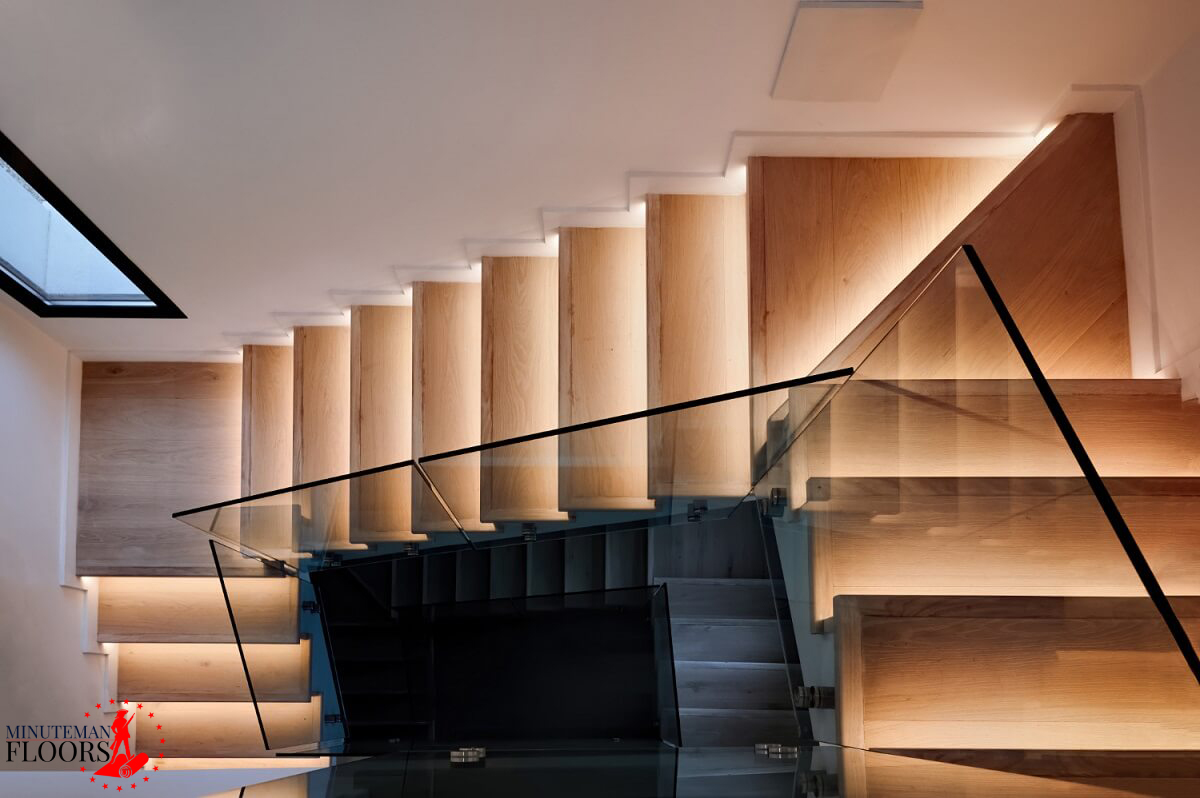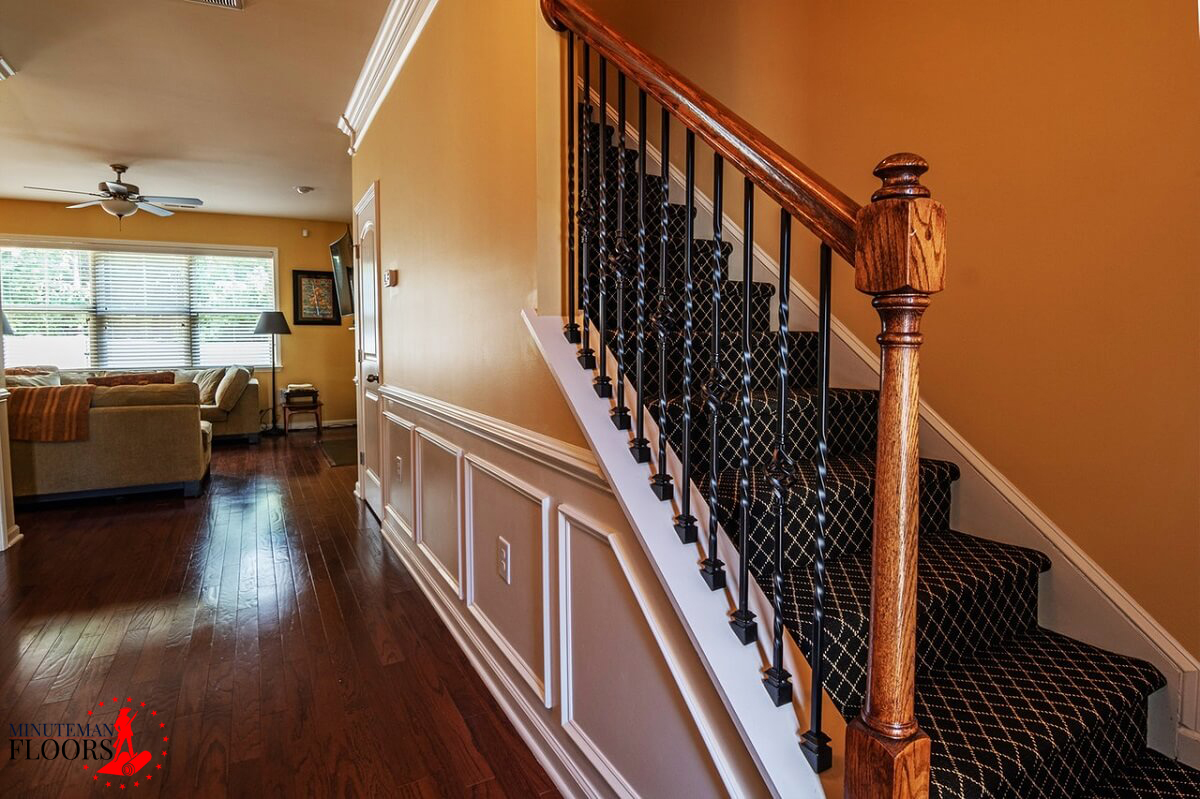The staircase is a focal point in any building, especially in a house. That is why it is crucial to enhance its design and style with the best flooring options for stairs in the market. Although the right stair flooring materials can significantly improve the overall aesthetic of your place, the most important factor to consider when choosing a flooring material for a staircase is safety.
In this article, we will introduce the best flooring options for stairs that not only ensure safety but also elevate your home décor. In addition, we will discuss the factors you should consider when choosing appropriate flooring for stairs. And, at the end, we will address some of the main questions and concerns regarding staircase flooring options.
Stairways can be hazardous if the flooring is not installed properly. Only trust a professional flooring contractor for your staircase flooring installation. Call to discuss your project.
Factors to Consider When Selecting Stair Flooring Materials
National Safety Council reported stairway accidents are responsible for an annual rate of 12,000 deaths and many more injuries. This means slipping, tripping, and falling down the stairs are the second most common cause of accidents in the US after motor vehicles. This is enough to make you think more carefully about the safety of stair flooring in your place.
So, let’s go over some of the key considerations to keep in mind when going through the best flooring options for stairs. And, they are not just about safety!
Staircase Flooring Safety Considerations
- Slip-resistance: To prevent slipping and falling down the stairs, the flooring must have a slip-resistant surface. Therefore, flooring materials with a high coefficient of friction are safer. Or you can use non-slip treads, mats, or rugs for your stairs.
- Evenness: There should not be any bumps, cracks, or loose parts that can lead to tripping. That is why professional stair flooring installation matters. Also, regular inspections to detect any such problems and repair the flooring as soon as possible.
- Durability: Choose a stair flooring material that can withstand heavy foot traffic without needing to be repaired frequently.
- Contrast: A good solution to making the stairs more visually distinguishable is using contrasting colors between the stair flooring and the flooring in the surrounding area. This is particularly helpful for kids and the elderly.
Except for these three stair flooring safety measures to consider before installing or replacing your staircase flooring, make sure the area is well-lit, and the handrails are properly secured and attached. Besides, regular maintenance and cleaning is another significant factor in keeping your stairs safe.
Stair Flooring Style and Design
Besides safety, the staircase flooring must complement your home design and go with the style to improve the aesthetic appeal. For example, the color and texture should be in harmony with the overall décor.
In addition, if you are not going to revamp your staircase every few years, it is better to go with more neutral, classic, and timeless looks, such as natural materials.
Reducing Noise Level
Depending on the staircase flooring material, it can be noisy when you walk on it. In residential settings, noise reduction is usually a concern. So, select stair flooring materials that can absorb sound, such as carpeting.
Budget Considerations
As we will see in the following section, there are several best flooring options for stairs each of which comes with a different price range. Also, except for the cost of the materials, you should take into account other factors, such as installation fees, maintenance, and longevity.
For example, while the upfront cost for hardwood stairs can be steep, hardwood flooring is durable and timeless. There are also some more budget-friendly stair flooring options, like laminate stairs.
Therefore, it is necessary to first determine your budget to make the selection process easier for yourself.
4 Best Flooring Options for Stairs
Most flooring materials can be used on stairs as well. However, some of the best flooring options for stairs are listed below which can meet both your practical and aesthetic requirements. We will discuss the pros and cons of stair flooring materials one by one.
Hardwood Stairs; Elegant but Vulnerable to Moisture

Pros:
- Classic, timeless, and elegant: One of the best features of hardwood stairs is their unique aesthetic appeal. Hardwood brings warmth and natural beauty to your place.
- Longevity: Hardwood is one of the most durable flooring materials that can also be refinished to restore its original look. If you maintain it properly, you are going to enjoy your hardwood stairs for decades. So, it is great for high-traffic areas like staircases.
- Easy to clean and maintain: You can easily sweep or vacuum clean your hardwood stairs. Every once in a while, mopping can be useful for deep cleaning.
- Versatility: There are various wood species, hardwood finishes, stains, and textures that can go with any design and style of décor.
Cons:
- High upfront cost: Hardwood is an expensive material, but if you consider its high durability and low maintenance, it can be a cost-effective choice over time.
- Slippery surface: Hardwood stairs can be slippery, especially if you are wearing socks. So, you must think of adding an anti-slip varnish coating.
- Noise: Hardwood does not absorb sound, and it can even echo it. Therefore, to reduce the level of noise, you should use rugs or runners.
- Moisture vulnerability: Perhaps the main disadvantage of hardwood stairs is that wood cannot tolerate moisture and high humidity. So, spot-clean any spill as soon as possible to avoid damage and stains.
Carpeted Stairs; Safe and Cozy but Not Durable
Pros:
- Warm and Comfortable: The cushioned surface of carpeted stairs feels very comfortable and forgiving under your feet. In addition, in cold weather, it feels warm because the carpet can retain heat.
- Safe: Perhaps the best slip-resistant stair flooring material is carpet. It can reduce the risk of slipping and falling to a minimum. However, you should make sure that the carpet is properly fixed on the staircase, and that it does not buckle or bunch up. Using stair rods can be a good solution.
- Sound absorption: Carpet has sound absorption properties which makes it a great choice for noise reduction and transmission.
- Numerous design possibilities: You can find carpets in almost any color, various textures, patterns, and designs. So, you can customize the staircase flooring easily.
Cons:
- High maintenance: Carpet can gather dust and dirt, so regular vacuuming is a necessity. Also, in case of spills, removing stains from carpeted stairs can be a big challenge. In addition, as carpeted stairs can keep dust, pet dander, pollen, and other allergens, they might cause trouble for people with allergies. Besides, they can retain odors for a long time. This is particularly a problem for houses with pets.
- Lower longevity: As the materials are softer, it is not surprising that carpet is not as durable as hard materials, such as stone or hardwood. Its lifespan depends on both its quality and the amount of foot traffic.
Learn more about carpeted stairs by reading ‘The Best Carpets for Stairs’.
Do you need carpet flooring installation in New Hampshire? We offer our professional flooring services in Manchester and a few neighboring cities. Call to discuss your project!
Laminate Stairs; Affordable but Noisy
Pros:
- Budget-friendly: Laminate stairs can be one of the cheapest staircase flooring options in the market.
- Durable and resistant to scratches: Laminate is a highly durable flooring material that is not easily damaged by heavy foot traffic. It also resists scratches, stains, and fading.
- Low maintenance: Laminate can be cleaned easily with a broom, a vacuum cleaner, or a mop. Additionally, it does not require periodic refinishing and other extensive maintenance methods.
- Variety of designs: The decorative layer of laminate stairs can mimic any pattern, color, or design, like wood, tile, bricks, stones, etc. So, customization of design will not be a problem.
Cons:
- Slippery stairs: Laminate stairs can be slippery, especially when wet. So, you have to think of an anti-slip method to ensure safety. For example, using slip-resistant laminate or stair runners.
- Sensitivity to moisture: Laminate can get damaged by moisture. So, to prevent swelling, delamination, or warping of your laminate stairs, make sure you clean up spills immediately.
- Sound transmission: Laminate is a hard material that can make your footsteps more audible. However, using rugs or runners can reduce the noise to a great degree.
Vinyl Stairs; Waterproof but Susceptible to Gouges and Scratches
Pros:
- Affordability: Another affordable stair flooring option is vinyl. You can remodel your staircase without breaking the bank.
- High durability: The staircase is typically a high-traffic area. So, highly durable vinyl stairs can be great to withstand scratches, stains, discoloration, and other damages.
- Water resistant: Perhaps the most distinguishable feature of vinyl stairs is that water cannot damage them. That is why it is the best choice for basement stairs.
- Easy maintenance: Cleaning and maintaining vinyl stairs are easy and there is no need for regular extensive maintenance. Just to keep it clean and in good shape, have a schedule for sweeping or vacuuming. Also, use a mop with a mild detergent that is suitable for vinyl floors to deep clean your stairs once in a while.
- Variety of designs: To achieve your desired style and ambiance, you can choose from a wide array of colors, patterns, and designs that mimic natural materials.
Cons:
- Slipperiness: If the vinyl you choose does not have a slip-resistant surface, you have to use runners or rugs to avoid accidents. Please note that vinyl can become very slippery when wet.
- Vulnerable to sharp objects: High heels or heavy furniture legs can create gouges or deep scratches on vinyl stairs. So, although vinyl is very hard, it cannot hold out against sharp objects.
- Environmental and health concerns: Vinyl comes in different types some of which contain chemicals or VOCs (volatile organic compounds). They can be harmful to the environment and indoor air quality. So, it is essential to choose a type of vinyl that meets the environmental standards.
To sum up, you should weigh the advantages and disadvantages of each stair flooring option and choose the one that is specifically suited to your staircase’s requirements, budget, and personal preferences to make the right decision. Consulting with an expert can always shed light on matters you are not sure about.
FAQs about the Best Flooring Options for Stairs

We have reviewed four of the best flooring options for stairs, but there are some frequently asked questions we get when talking to customers. Here, we are trying to answer some of them.
What Is the Most Affordable Stair Flooring Option?
Vinyl, laminate, and concrete stairs offer affordability as well as versatility of design.
Can I Install Stair Flooring by Myself?
While DIY stair flooring installation is possible, particularly for laminate stairs, to make sure your staircase is safe, the installation should be done properly and professionally.
Are Tile Stairs Safe?
Tile stairs can be slippery, so making the surface slip-resistant is crucial. In addition, tiles can crack relatively easily or become loose, which can result in accidents. Therefore, regular inspection is necessary to make sure your tile staircase is safe.
What Staircase Flooring Material Is Suitable for Outdoor Stairs?
Stone sounds like the best option for outdoor stairs because stone stairs are highly durable, heat and water-resistant, and low-maintenance.
What Are Some Tips on Cleaning and Maintenance of Stair Flooring?
While each type of stair flooring requires specific care and maintenance, there are some general tips for all kinds of staircase flooring.
- Place doormats at the foot of the stairs to keep them away from excessive dirt and dust.
- Use stair treads or runners to protect the stair flooring from daily wear and tear, especially in high-traffic areas.
- Regularly inspect the stair flooring to make sure there are no safety hazards, such as loose planks or tiles.
- Do not use abrasive cleaners and harsh chemicals on the staircase flooring.
Wonder how much money you should allocate to your stair flooring installation? Call for a free quote!
Professional Installation for Stairs; Experienced Flooring Contractor in New Hampshire
To ensure safety, quality, durability, and visual aesthetic, and add value to your home, professional installation for stairs is key. And, if you are residing in Manchester, Hooksett, Bedford, Candia, and Goffstown, look no further!
Minuteman Floors offers various types of flooring materials and installation, as well as flooring replacement, repair, and refinishing. You will also have our flooring professional for consultation before starting your flooring project. Contact us at 800-315-2185 to ask your questions and schedule an appointment.

